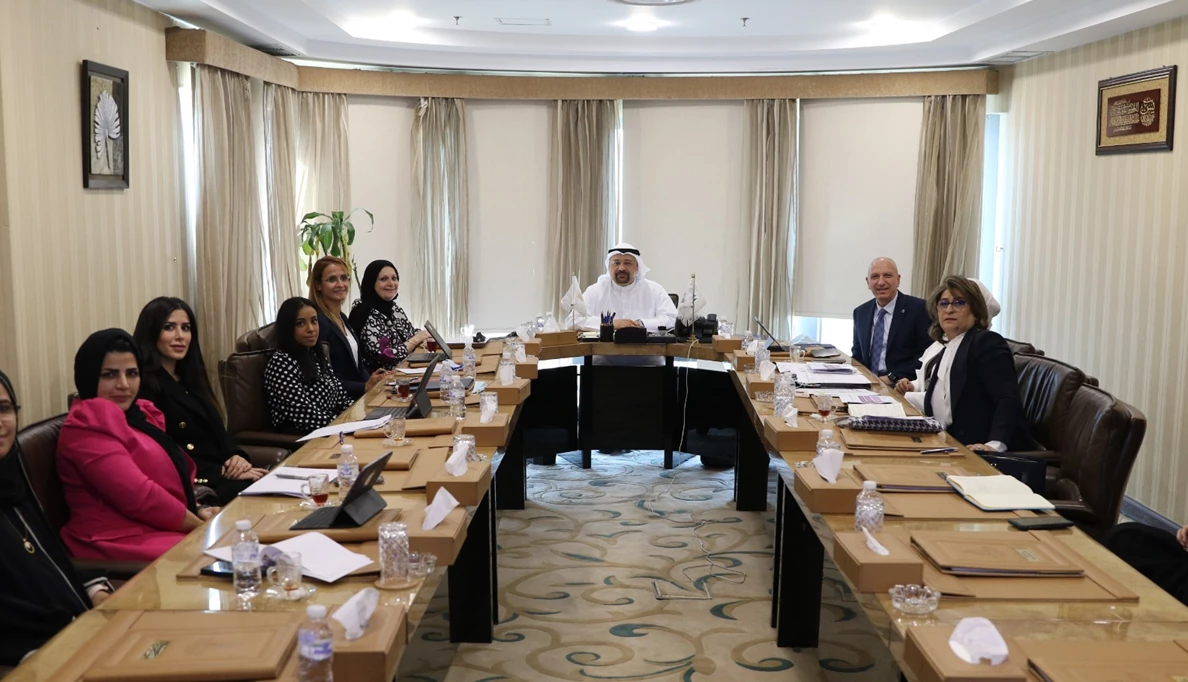 امرأة تعمل على الكمبيوتر والهاتف.
امرأة تعمل على الكمبيوتر والهاتف.
Kuwaiti women have long been recognized as pioneers with a voice in social, political, intellectual, and cultural fields, throughout the country's history. The first Arab woman president of a university was from Kuwait at the Kuwait University, and women who have served as editors-in-chief of major newspapers, magazines, and multi-media outlets. Due to recent efforts and success in appointing female judges for the first time in Kuwait’s history, more women are pursuing careers as public prosecutors and more women lawyers are emerging. All these steps that Kuwait has taken to support and empower women in a variety of fields as part of its implementation of the UN’s Sustainable Development Goal 5.
Economic growth in Kuwait cannot be achieved without the full economic empowerment of women. This is one reason why the World Bank Kuwait Country Engagement Framework (CEF), which was recently approved by the Kuwaiti government in August 2021, includes a stand-alone Gender Engagement Framework, which mandates that all advisory services provided by the World Bank in Kuwait be viewed through a gender lens. The CEF will support a cross-cutting approach to increasing women's economic opportunities and will work to create an environment that is conducive to their employment, entrepreneurship, and leadership as well as their advancement in the workplace. The World Bank- Kuwait Gender Engagement Framework, is the first of its kind in the Gulf Cooperation Council (GCC) region.
In addition, Kuwait has been prioritizing women's economic empowerment in other key policy instruments, such as the new national plan for Kuwait called Vision 2035/New Kuwait. Kuwait's "New Kuwait" development strategy aims to transform the country into a regional financial, cultural, and institutional pioneer by 2035. It is built on five strategic axes and seven pillars: public administration, economy, infrastructure, living environment, healthcare, human capital, and global position. The Government of Kuwait aims to boost women’s engagement in the labor market under the Creative Human Capital pillar, in alignment with Goal 5 of the Sustainable Development Goals on gender equality. Vision 2035 aspires to transform the country into a knowledge-based economy by empowering the private sector to serve as the primary engine of growth. To achieve this goal, equal opportunity for men and women must be provided in order for both to be effective contributors to the vision.
Furthermore, as part of the SDG 5 program of the General Secretariat of the Supreme Council for Planning and Development, and in collaboration with the Kuwait University Women's Research and Studies Center, UN Women, and the United Nations Development Program (UNDP), the Women's Empowerment Program (WEP) initiative in Kuwait was launched. The Women's Empowerment Principles (WEPs) are a set of guidelines for businesses on how to advance gender equality and women's empowerment in the workplace, marketplace, and community. They were developed by the United Nations Global Compact and UN Women. This initiative is geared toward the private sector and includes several companies. Its mission is to accelerate the implementation of Kuwait's new Vision 2035 by increasing the representation of women in leadership positions. In 2021, 14 new private sector companies committed to the WEPs to better diversify their workplace and promote women’s employment, bringing the total number of companies who adhere to these principles to 44.
And to further support these gender reform efforts, the General Secretariat of the Supreme Council of Planning and Development formed the Women's Affairs and Business Committee in May 2021 with the mandate of boosting women’s economic empowerment. Since its inception, the Committee has focused on increasing women’s participation in the workplace. It played a pivotal role in pushing through reforms in October 2021 to mandate non-discrimination based on gender in employment and to prohibit and criminalize sexual harassment at the workplace, in collaboration with the World Bank’s Business Regulations for Gender Equity Advisory team under the National Jobs Strategy Project.
While obstacles such as occupational segregation, a low female labor force participation rate, and social norms that restrict women's access to economic opportunity do still exist, there are also many opportunities to open the door for greater economic inclusion of Kuwaiti women. The above-mentioned significant steps already taken by Kuwait are a sign that the country means business, and other countries in the region can take note of these different multi-layered approaches in their plans to empowering women.




Join the Conversation